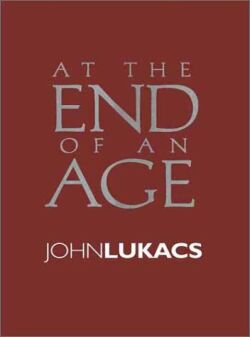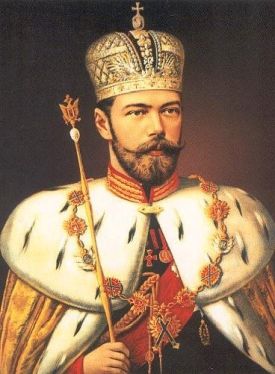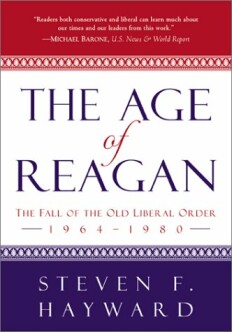The Historian as Futurologist
from CrisisJohn Lukacs’s At the End of an Age is not quite the book it is advertised as being. The title and opening chapter do indeed address the question of periodization, usually a matter for recondite arguments among professional historians, and what it means for us to be present — as Lukacs believes we are — as history’s odometer clicks over. The signs of the passage of the 500-year-old Modern Age, he says, are now too many to be ignored. It was an age of reason and science, of economic growth and social mobility, of European hegemony and bourgeois predominance and progress towards democracy. All of these things have now come to a period and will continue — if they continue — in some altered form.
But this is the second time that Lukacs has set out to devote a whole book to this subject — the first was The Passing of the Modern Age in 1970 — and he now wants to spend less time looking back at the Modern and more time developing his ideas about what it is that is to come after it. Unfortunately, like most futurology, these are vague, speculative and strongly tendentious. Lukacs has got a bee in his bonnet about the pretensions of science, and especially scientific determinism, and so he imagines that the future age will define itself by its cutting science down to size and returning us, amazingly enough, to a geocentric universe.
Actually, I’m not sure he is predicting any such development, but it is only on the assumption that he is that we can make any sense of the end of the book in terms of its beginning. Attempting to avoid the stigma of being a scientific determinist himself, perhaps, he confines his argument to making an advocate’s case for the new geocentrism and anthropocentrism “We did not create the universe,” he handsomely concedes, “but the universe is our invention; and, as are all human and mental inventions, time-bound, relative, and potentially fallible.”
I have a lot of sympathy with this argument, and with its corollary that “All our dignity consists. . .in thought.” All the universe’s dignity too, he might have added. I agree with him emphatically in regarding the scientific willingness to abandon the human scale for the chimera of the immensities of “space” and its putative population of “aliens,” which amount to an American craze. All such temptations of science fiction are really a form of scientific hubris. But this is really too big a subject to be tacked on as a coda to his valedictory to the Modern Age, and the mixture of the two things is ill-advised and very difficult for the reader to follow.
The limitations and the excessive ambition of the book can be seen in the penultimate chapter in which Lukacs attempts to draw an elaborate analogy between the measurement of the behavior of sub-atomic particles according to the Heisenberg Uncertainty Principle and the strictly historical question, familiar to him from many of his own books on the subject, of the career of Adolf Hitler. Knowledge in both cases is qualified by uncertainty, right enough, but this is too small a ground for comparison in view of the immensity of the differences between them. It sounds like a joke: how is Hitler like an elementary particle? Both are unpredictable! Ba-da boom!
In a way this kind of thinking is the mirror image of what it was conceived to combat, namely the quantification of historical studies along allegedly scientific lines. Lukacs rightly makes the case for the subordination of science to history, rather than vice versa, yet his own insistence on the analogy between history and physics in the form of Heisenberg’s Uncertainty principle seems to me to be more an example of the latter than the former. It also leads him into some rather dubious territory, as when he writes contemptuously of “the futility. . .of the entire objective/subjective antithesis: two sides of the same outdated and debased coin.”
Huh? One can sympathize with the effort to caution us against false dualities, or to point out that objectivity and subjectivity are intermingled in everything — that there is no such thing as a pure form of either — but this doesn’t mean that they can be discarded as intellectual tools. He makes a good point when he says that “ten or thirty or sixty years after Hitler’s death a Patagonian or a Zambian may be more “objective” about him than a German or a Jew: but will he understand Hitler better?” But all this shows is that ideas of objectivity and subjectivity are not always particularly helpful, not that they are futile or outdated — a concept which is itself based on false scientific analogies.
Yet much can be forgiven a writer like Lukacs for the flashes of brilliance that peep out from behind the confusing and haphazard structure of his book. One of my favorites comes in the context of pointing out that “all of the frantic assertions of ‘modernity’ notwithstanding, the twentieth century was largely one of intellectual (and artistic) stagnation.” Consider, for instance, the fact that the great modern masters, Darwin, Marx, Freud, Einstein, assumed that position by the beginning of the century and still held it — with some slippage on the part of Marx and Freud — at the end of it.
Nothing like such a protracted prestige existed in previous centuries. Were we to consider who were thought the giants of intellect and of art, say, in 1820 and then in 1890, we would get an entirely different list of great names: say, Goethe, Chateaubriand, Beethoven around 1820 and Nietzsche, Ibsen, Wagner sixty or seventy years later.
This is not only true in itself but it leads to many other truths, some of which Lukacs himself adumbrates. In pointing out, for instance, that
perhaps the essential fault of Darwinism is its implicit denial that there is any fundamental difference, no matter how physically slight, between human beings and all other living beings. One need not be a religious believer to struggle against this: for if there is really no essential difference between human beings and all other living creatures, then there is no reason to have laws and institutions and mores prohibiting certain human acts and protecting human dignity, indeed, human lives.
Lukacs provides, besides his own insights, those of many others. In fact, this is a sort of commonplace book, a collection of odds and ends, many relegated to footnotes that amount to a running commentary on the text, a pre-supplied marginalia that are endlessly distracting from what the best will in the world could hardly describe as the clean lines of the main argument.
His heroes are Pascal, Kierkegaard, Pierre Duhem, C.S. Lewis, Owen Barfield, Caryl Johnston, Antal Szerb, Werner Heisenberg, Simone Weil; his villains are Descartes, Einstein, and Thomas S. Kuhn. Not villains in themselves, perhaps, but pernicious in their influence on both scientific and historical thinking.
He gives too short shrift to R.G. Collingwood, with whom he is engaged in a common quest to make science subordinate to history. This is perhaps because Collingwood was Einstein’s historian as Lukacs is Heisenberg’s. But there is more in common between them than he admits. Just as Collingwood saw the immense implications for history in the theory of Relativity, so Lukacs sees them in the theory of Indeterminacy, and both proceed, somewhat paradoxically, to use the insights of science to attempt to persuade us of history’s priority to science. But in the end this is a matter of belief rather than demonstration, and Lukacs’s relegation of the question of religious faith to a few pages at the end will I hope suggest a new direction for his next book.
Discover more from James Bowman
Subscribe to get the latest posts to your email.







